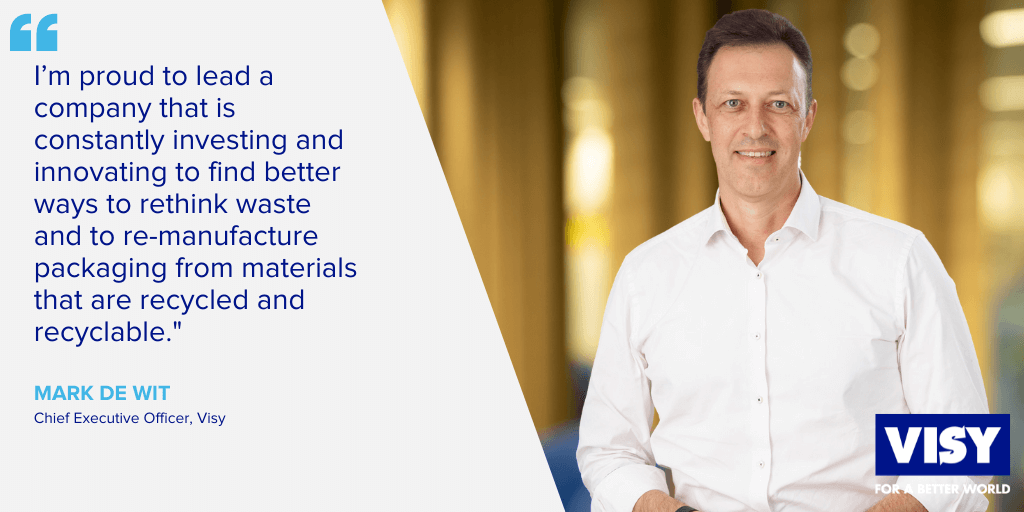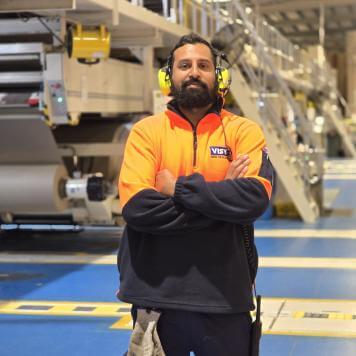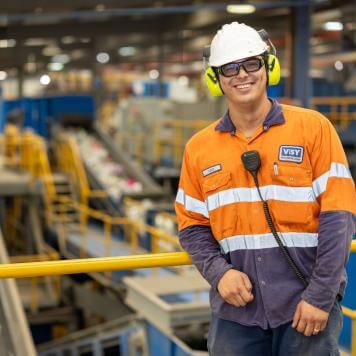We talked with Mark De Wit, Visy Chief Executive Officer, about the biggest challenges and opportunities ahead for the industry. This is what he had to say.
Visy is one of the region’s largest businesses that link recycling and re-manufacturing at scale to support the circular economy. What does this mean and why is it so important?
The very essence of our business is to take and sort massive weekly collections of used paper, plastics, aluminium, steel and glass from households and businesses, for re-manufacture predominantly back into new sustainable packaging products, rather than the waste going to landfill. This is important for two reasons.
Firstly, as organic material decomposes in landfill it emits methane, one of the most potent climate-warming gases. By keeping material out of landfill we can limit harmful greenhouse gas emissions that cause climate change. Recycling is one of the most important actions we can all take as individuals to influence positive environmental action.
Secondly, by keeping this recyclable material in the economy – and reusing it for a practical purpose – we reduce our communities’ reliance on natural resources. We are seeing a massive focus across the industry on increasing the use of packaging that is both recyclable and made of recycled materials, locally.
What type of challenges is the industry facing in the short to medium term?
In the short-term, like many industries, we’ve experienced some of our most challenging conditions over the past couple of years throughout the pandemic. Supply chains have been majorly impacted by COVID-19 and, more recently, by the Russia-Ukraine crisis. We’re fortunate at Visy that we have internal Global Logistics expertise - that we also offer to our customers - that is helping us navigate some of these issues. Our focus over the past couple of years has been on ensuring steady supply to our customers, as clearly packaging is a fundamental requirement in the food supply chain.
Looking longer term, in 2020 the Australian Government introduced the Recycling and Waste Reduction Act 2020. The Act regulates the export of certain types of waste, with the bans being progressively introduced from 2021 to 2024. We’re working with government, industry and customers to meet and address the new requirements, including investing and innovating in new technologies, recycling infrastructure and manufacturing capability. In fact, we have more than 140 projects planned over a ten-year period focused on reducing landfills while increasing the recycled content of the sustainable packaging we produce for customers.
This means we’re also planning for the team of the future. We currently employ more than 7,000 people across Australia and New Zealand and we need to maintain and develop the team to support our future plans and project pipeline. It’s important we have the right people on board to help us deliver on our vision to be the global leader in sustainable packaging solutions. We need to recruit, train and keep people who are aligned with our vision and are looking for work that makes a lasting impact.
Tell us a bit more about the actions the industry is taking to increase the sustainability of packaging?
The APCO 2025 National Packaging Targets require the industry to drive systematic change in the way packaging is designed, produced, collected and recovered. The targets are ambitious and will require both technical change from industry and behavioural change from end consumers to be achieved. At Visy we’re working really closely with our customers across design and production to develop packaging that will help us collectively meet the targets.
This means we’re looking for opportunities to use sustainable packaging materials, to include recycled content in packaging design, and to improve and support recyclability of packaging.
At a macro-scale it means we’re investing large amounts of money – our Chairman Anthony Pratt has pledged $2 billion over the next 10 years – to constantly innovate to find better ways to rethink waste, redesign supply chains and to re-manufacture packaging from materials that are recycled and recyclable.
How does Visy specifically help customers meet these targets?
Visy is uniquely placed – as both a recycler and a manufacturer of sustainable packaging – to help our customers move to packaging options that are made from recycled materials and that are recyclable.
It’s about developing packaging solutions that minimise environmental and social impacts throughout the product’s entire lifecycle. We have many examples of the impressive and innovative work our teams across the business are involved in to achieve this end for our customers.
Like the work done at our Smithfield rPET and rHDPE plant where we can now recycle PET thermoforms, including pots tubs and trays, and coloured PET bottles. Hand in hand with these improvements is our capability to produce Australia’s first HDPE milk bottle made with 50% recycled plastic.
And our glass teams who are continuing to increase the recycled content in the glass bottles and jars they produce, aiming for an average of 70% recycled glass, while also working on ‘light weight’ glass packaging – resulting in lower greenhouse gas emissions for every glass bottle and jar produced.
We also have the development of the Enviropunnet, a recyclable sustainable punnet that is helping phase out single use plastics packaging for fruits and vegetables, and our fibre based cluster packs that eliminate the need to use plastic shrink wrap around beverage cluster packs.
These are just a few examples of the innovative work that is taking place to support our customers in achieving their important sustainability targets.
I’m proud to lead a company that is constantly investing and innovating to find better ways to rethink waste and to re-manufacture packaging from materials that are recycled and recyclable. As our tagline says, we really are ‘For a better world’.



